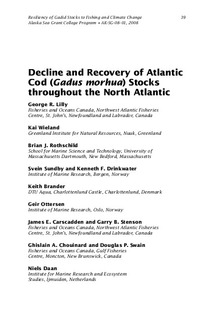| dc.contributor.author | Lilly, George R. | |
| dc.contributor.author | Wieland, Kai | |
| dc.contributor.author | Rothschild, Brian J. | |
| dc.contributor.author | Sundby, Svein | |
| dc.contributor.author | Drinkwater, Ken | |
| dc.contributor.author | Brander, Keith | |
| dc.contributor.author | Ottersen, Geir | |
| dc.contributor.author | Carscadden, James E. | |
| dc.contributor.author | Stenson, Garry B. | |
| dc.contributor.author | Chouinard, Ghislain A. | |
| dc.contributor.author | Swain, Douglas P. | |
| dc.contributor.author | Daan, N. | |
| dc.contributor.author | Enberg, Katja | |
| dc.contributor.author | Hammill, Michael O. | |
| dc.contributor.author | Rosing-Asvid, Aqqalu | |
| dc.contributor.author | Svedäng, Henrik | |
| dc.contributor.author | Vázquez, Antonio | |
| dc.date.accessioned | 2010-10-26T08:36:04Z | |
| dc.date.available | 2010-10-26T08:36:04Z | |
| dc.date.issued | 2008 | |
| dc.identifier.citation | Resiliency of Gadid Stocks to Fishing and Climate Change, 2008: 39-66 | en_US |
| dc.identifier.isbn | 978-1-56612-126-2 | |
| dc.identifier.uri | http://hdl.handle.net/11250/109356 | |
| dc.description.abstract | Many stocks of Atlantic cod (Gadus morhua) on both sides of the North
Atlantic are currently at much reduced levels of biomass, but this situation
is not in all instances the result of long, continuous decline. Most
Northwest Atlantic stocks declined to low levels during the 1970s, but
increased during the 1980s before declining even more severely during
the late 1980s and early 1990s. Several of these stocks have shown
little recovery despite severe restrictions on directed fishing. Many
stocks in the Northeast Atlantic have experienced sustained increases
and sustained decreases, but generally not in concert. Among-stock
comparisons illustrate that fishing has played a dominant role in the
dynamics of all cod stocks, but variability in climate has contributed
to variability in recruitment, individual growth, and natural mortality.
A cooling event during the last three decades of the twentieth century
contributed to the rapid decline of several stocks in the Northwest
Atlantic, and changes in life-history traits (growth rate, age and size at
maturity) and in the biotic environment (predators and prey) may be
contributing to recovery being slow. | en_US |
| dc.language.iso | eng | en_US |
| dc.publisher | Alaska Sea Grant College Program | en_US |
| dc.subject | stock fluctuations | en_US |
| dc.subject | bestandssvingninger | en_US |
| dc.title | Decline and Recovery of Atlantic Cod (Gadus morhua) Stocks throughout the North Atlantic | en_US |
| dc.type | Chapter | en_US |
| dc.subject.nsi | VDP::Agriculture and fishery disciplines: 900::Fisheries science: 920::Resource biology: 921 | en_US |
| dc.source.pagenumber | s. 39-66 | en_US |
| dc.identifier.doi | http://dx.doi.org/10.4027/rgsfcc.2008.03 | |
